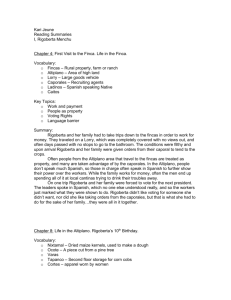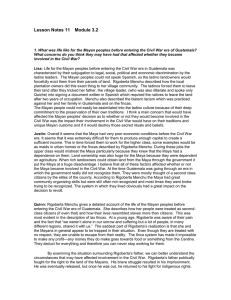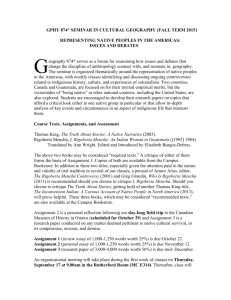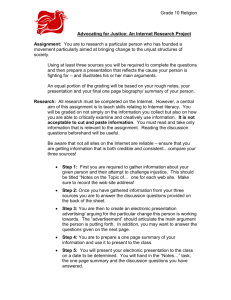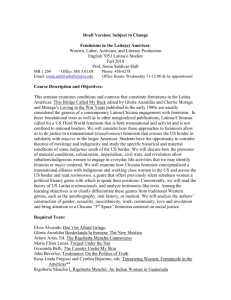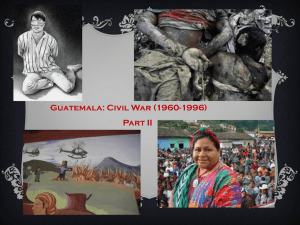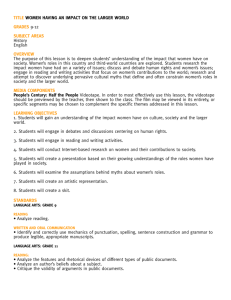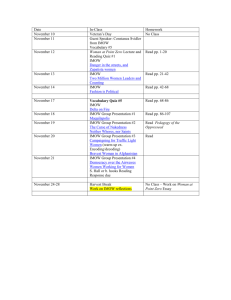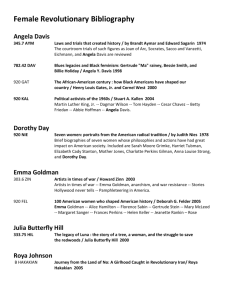Rigoberta Chapter SumsKari 2
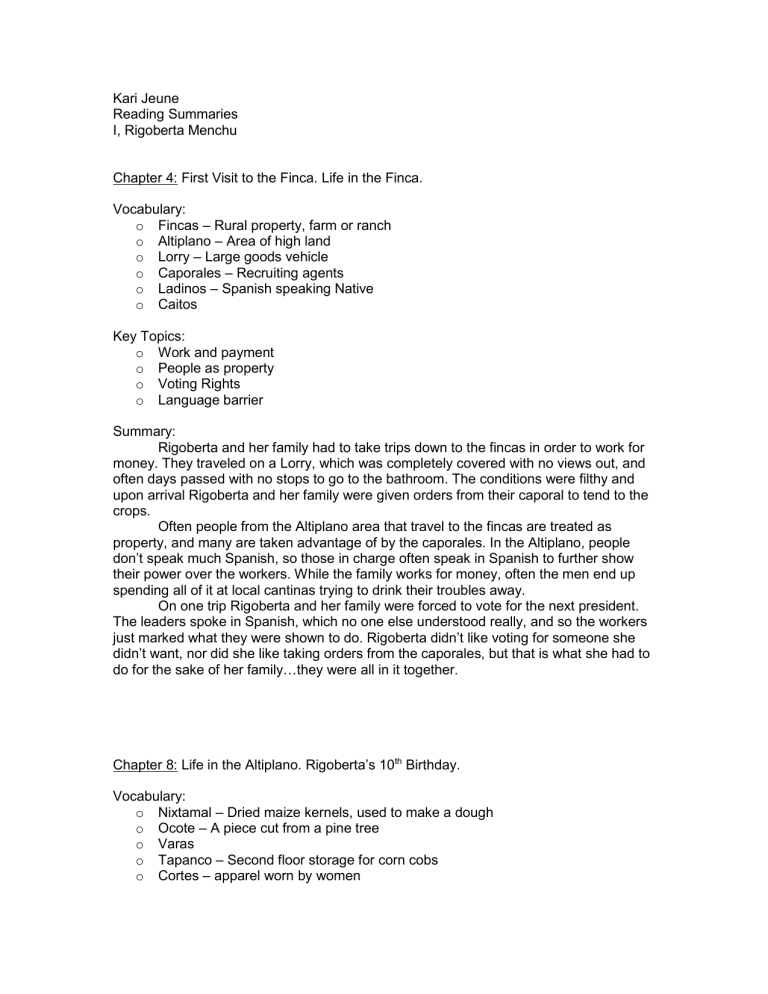
Kari Jeune
Reading Summaries
I, Rigoberta Menchu
Chapter 4: First Visit to the Finca. Life in the Finca.
Vocabulary: o Fincas – Rural property, farm or ranch o Altiplano – Area of high land o Lorry – Large goods vehicle o Caporales – Recruiting agents o Ladinos – Spanish speaking Native o Caitos
Key Topics: o Work and payment o People as property o Voting Rights o Language barrier
Summary:
Rigoberta and her family had to take trips down to the fincas in order to work for money. They traveled on a Lorry, which was completely covered with no views out, and often days passed with no stops to go to the bathroom. The conditions were filthy and upon arrival Rigoberta and her family were given orders from their caporal to tend to the crops.
Often people from the Altiplano area that travel to the fincas are treated as property, and many are taken advantage of by the caporales. In the Altiplano, people don’t speak much Spanish, so those in charge often speak in Spanish to further show their power over the workers. While the family works for money, often the men end up spending all of it at local cantinas trying to drink their troubles away.
On one trip Rigoberta and her family were forced to vote for the next president.
The leaders spoke in Spanish, which no one else understood really, and so the workers just marked what they were shown to do. Rigoberta didn’t like voting for someone she didn’t want, nor did she like taking orders from the caporales, but that is what she had to do for the sake of her family…they were all in it together.
Chapter 8: Life in the Altiplano. Rigoberta’s 10 th Birthday.
Vocabulary: o Nixtamal – Dried maize kernels, used to make a dough o Ocote – A piece cut from a pine tree o Varas o Tapanco – Second floor storage for corn cobs o Cortes – apparel worn by women
Key Topics: o Family life and expectations o Child to adult journey and expectations as an adult
Summary:
Life in the Altiplano is one of hard work and dedication. Everyday Rigoberta and her family wake up early and begin their daily routines. The women would prepare breakfast, typically tortillas, and clean around the house. The men go off to tend to the fields and work all day until late at night. Homes in the Altiplano are small but provide good shelter, and the family all shares the space.
On Rig oberta’s tenth birthday, her parents and siblings celebrated her entry into adulthood. Each family member shared their experiences and gave advice on various issues. There is a meeting held before the community to also celebrate Rigoberta’s entry into adul thood. This meeting is important because it recognizes Rigoberta’s knew responsibilities as an adult and her obligations to the community.
Chapter 12: Life in the Community
Vocabulary: o Nahual – Mortal’s ability to transform into another form o Huipil – Form of Maya Textile and tunic or blouse o Centavo – Common unit of currency
Key Topics: o Obligations to community o Catholic religion and cultural beliefs o Role of men and women
Summary:
Community involvement is very important in Rigoberta’s culture, and as she gets older her role takes on new levels. She must visit with neighbors and help with daily chores and harvesting the area crops. As a woman she is expected to stay at home and cook meals for the working men, fetch water for the community, and gather with other women for weaving activities. Men have much more freedom, but have equally as many things they are in charge of doing.
The Catholic religion is prominent in Rigoberta’s culture, but what her people try to do is blend Catholic beliefs with th eir own cultural views. Many people don’t really understand priests that come to visit with the community but they follow in prayer and
Catholic ways for that is what is expected. Rigoberta takes on the role of serving as a middle man between the priests and community members, talking to her people about the Catholic religion and sharing stories of the bible.
Chapter 14: A Maid in the Capital
Vocabulary: o Perraje – A shawl
Key Topics: o Work versus Slavery o Poor versus Rich o Sacrifices for survival
Summary:
For the sake of her family, Rigoberta must travel to the capital and find work for a wealthy family. She takes with her what little belongings she has, and becomes a servant for a family. The woman in charge is quite rude and constantly tells Rigoberta that she is filthy and a disgrace to look at. In fact the woman claims to give her a pay advance to buy clothes, but really it isn’t enough to buy everything and Rigoberta must work for months without pay. There is another servant girl, who is much more daring, and she stands up to the woman in charge. Rigoberta is afraid to do the same for she knows that her family needs the money.
Once Rigoberta’s father visits her because he needs money, but unfortunately
Rigoberta doesn’t have any. The other servant managed to get the woman in charge to give him some change, but this meant again that Rigoberta was going to have to work without pay. As more time passes, the woman becomes fed up with the other servant and fires her, leaving all the work to Rigoberta. Towards the end of the chapter
Rigoberta has had enough and tells the woman she is leaving, but this decision comes with the news that her father is in jail…
Chapter 15: Conflict with the landowners and the creation of the CUC
Vocabulary: o Peones - laborer
Key Topics: o Local authority versus Governmental authority – Levels Within o Land Rights
Summary:
The chapter starts off with Rigoberta’s father in prison for fighting for their land, and unfortunately the judicial system is very corrupt. The judges take bribes and the process to even speak to a high authority figure requires bribery, witnesses, signed papers, and usually a translator. Often signed papers are documents that Rigoberta and others can’t read and translators twists words around, giving incorrect information. By putting Rigoberta’s father in prison, authorities were trying to break the strength of the community, but eventually he was released.
The fight for land was of highest concern and while Rigoberta’s village felt they had a right to ‘their’ land, the Brols, Garcias, and other large families continually tried to take it away. These large families would send in engineers to test the soils and threatened to make the locals their laborers unless they gave up the land. Going to the authorities really did nothing and only made the families angrier. At one point, the Brols came in and threw everyone out of their homes by trashing everything in site.
Surrounding villages tried to help, but the Brols came back stronger with each time.
Rigoberta’s father began to travel to other villages and the capital in hopes of getting the Brols to bake down. The INTA made the declaration the problem was solved and that all the people had to do was sign a piece of paper for rights to the land. Of course the paper was signed, however it stated that the land was theirs for only 2 years at which point they would freely give it to the Brols. Upon figuring out this act of trickery,
Rigoberta’s father began to seek help from the Unions. However the problem continued to get worse and late in the chapter Rigoberta’s father is badly beaten and tortured.
It was apparent that Rigoberta’s father was in great danger since he was seen by authorities as the leader. In fact he was thrown in jail a second time as a warning sign to others who followed in his steps. Despite the Brols or ‘landowners’ attempts, they
could not break the villages desire to fight back. Prior to go ing in hiding, Rigoberta’s father along with other peasants organized the CUC, a committee dedicated to reclaiming their land.
Chapter 19: Attack on the village by the army
Vocabulary: o Jutes – River Snail
Key Topics: o Personal Rights – Government Delegates what one can and cannot do
Summary:
Rigoberta had come to love and befriend lots of people while working in the
Finca and helping surrounding villages; in fact many of the women she considered close friends. Along with the corrupt government came a corrupt army and many of the soldiers would harasses and rape the women in the villages. Taking it very personal
Rigoberta decided that she needed to educate and encourage these women and the rest of the people to fight back against the army. Following in her Father’s footsteps she began to help others set up traps for the soldiers and put into place plans of action for when the soldiers would come to rape the women. One night as the villagers were signaled that soldiers were coming, they picked up everything and headed towards the mountain hoping that when they returned their traps would have some surprises.
Unfortunately on this night, an old woman could not find the strength to travel with the rest of the villagers, so she decided to stay behind knowing that she could die. When everyone returned the next morning not only was the woman still alive, but she had killed and trapped a few soldiers.
With a live soldier at the village’s mercy, the people had a chance to find out why the army did the things that they did. The soldier told a story of corruption and power and explained that many don’t want to do the bad things but are threatened with their lives if they don’t obey orders. Having mercy on the soldier, the village eventually let him go, and now with this new understanding the people were even angrier about their situation.
If anything this made their fight even stronger.
Chapter 20: The death of Dona Petrona Chona
Key Topics: o Unfair judicial system, what judicial system?
Summary:
A man from one of the large authority families, the Garcias, became very fond of a local married woman, Dona Petrona Chona. He spent his days asking her to be his, but really it came as threats and warnings to give in. Dona tried to tell him no and explained that she was a married woman. The man, Carolos Garcia, could not accept this response and in fact went to her for one last request. When she again said no, he left to only send his bodyguard to kill her later that night.
Villagers found her body chopped into pieces and in fear of conflict with the authorities just left her body parts lay for days. Rigoberta and her father took upon themselves to give Dona a proper burial, and in the end the bodyguard only served 15 days in jail.
Chapter 21: Farewell to the community: Rigoberta decides to learn Spanish
Key Topics: o Personal responsibilities to Community – Leaders Role and Obligations
Summary:
Rigoberta and her father have been working very hard to seek freedom from the landowners and corrupt figures in authority; in fact they both had been gone from their villages for quite some time. One of the last moments spent with the entire family was a farewell fiest a that marked Rigoberta’s dedication to her community.
The village came together and cooked the best of the best, played musical instruments, and sang and danced into the night. Rigoberta and her father were the guests of honor, and the fiesta represente d the community’s appreciated and support for the work they had done. Rigoberta’s father made a speech that talked about the importance of family and that the community was one family and must look at each others as that way. The fiesta went until daylight and in the end it was a sad farewell for many but also a sign of hope that good things are to come.
Chapter 25: Rigoberta’s father dies in the occupation of the Spanish embassy. Peasants march to the capital.
Key Topics: o Protesting – Call to Action
Summary:
Rigoberta and her father continued to work towards freedom for their people, and often this meant that the two would not see each other for long periods of time. Their work, along with the work of others was giving their people the power to organize groups and systems that could help to fight the corrupt government.
The last time that Rigoberta did see her father, he requested to have her presence at a march on the capital. The event was to protest the repression from the government in the El Quiche area, and demand that the army leave. The protestors took over several radio stations to spread the word about what was going on and even had plans to occupy the Spanish embassy. However those that went to occupy the embassy, along with Ambassadors and other authority figures, were burned to death taking the building down them.
Rigoberta remembers talk of burned bodies everywhere and a rumor of a lone survivor. Unfortunately to ensure that the ‘true’ story of what happened couldn’t get out, the authorities tortured the survivor and left him out in public as a message to remaining protestors. Rigoberta and her people took the event to heart and instead of backing down, they continued to push forward.
Chapter 31: Women and political commitment. Rigoberta renounces marriage and motherhood.
Key Topics: o A Woman’s Role and Rights o A Woman’s place amongst a Man
Summary:
There was once a time that Rigoberta had thought to be married and have a family, and in fact she fell in love with a good man. Growing up she learned a lot about being a woman from her mother and looked up to her in many ways… but times were different. The situation at hand had Rigoberta weighing the cost of her personal happiness versus her community’s happiness. She thought about the safety of her children and the worries she would have by having some. In the end Rigoberta made the choice of her community’s happiness over her own and said goodbye to the man she loved to continue forward with her cause.
The more and more that Rigoberta met other women like her, she also began to question the role that women should play amongst the men, as times were different than when she was younger. She questioned the need for women organizations and thought that really this was only separating the two genders even more. Rigoberta believed that all, male and female, were fighting this cause and therefore should fight it as equals.
Come to find out she was not alone in this thinking and many women felt there was no need to complicate things even more by ‘settling down’ and instead attention should stay focused on their people’s right to freedom.
